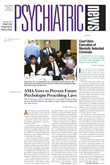The result of ear acupuncture treatments for addiction as reviewed in the March 1 issue was not at all surprising. I pointed this out in my book Beyond Yin and Yang and again in greater detail in the recent book The Biology of Acupuncture cowritten by me and Songpin Han (Warren H. Green Publishers Inc., 2002). But all is not lost. This book describes a scientific, evidence-based acupuncture derivative with a proven physiological action.
The neurosurgeon H.C. Wen first described the use of electrically stimulated needles in the ear for the successful treatment of addiction in 1975. When I met with him in Hong Kong, he pointed out that it was the electrical stimulation and not any mysterious placement of needles that was important. Addiction clinics in the United States have overlooked this essential use of electricity in their treatment. The ritual of needles, inserted in the ear without stimulation, adds only a placebo element for patients being treated in group sessions as part of an ongoing addiction treatment program.
The importance of electrical stimulation in acupuncture was announced in the 1950s when Chinese surgeons reported that electricity added strength to acupuncture analgesia. To further examine this finding, our group in Missouri received the first grant from the National Institutes of Health to study acupuncture. Using experimental pain in volunteers, we reported that electricity doubled the effectiveness of needles. Our finding that useful acupuncture points were motor points suggested that acupuncture acted through the nervous system and not by yin/yang, Qi, or meridians.
Thirty years of scientific research by Professor Han at Beijing Medical University in China on the scientific basis of acupuncture is described in his book, The Neuro-Chemical Basis of Pain Control by Acupuncture (Hu Bei Press, 1998). Recent fMRI findings described by Professor Cho at the University of California at Irving (Neuro-Acupuncture, Volume 1, Q-Puncture Inc., 2001) give further support to an evidence-based, no-needles form of biological acupuncture that has made obsolete the prescientific theories and mystical rituals of traditional Chinese acupuncture.
Han reported that specific frequencies of electrical stimulation induce the gene expression of specific neuropeptides in the CNS. Two Hertz stimulation is specific for raising endorphin levels in the diencephalon. The specific action of endorphins at cell mu receptors may well be important in explaining my success using this method for treating patients with PTSD and social phobias. Han found a cross-tolerance between electro-acupuncture and morphine, likely an important factor in the successful use of his method for treating heroin addiction in China.
Since retiring from practice, I have been teaching this useful technique to medical students. It is a simple method concordant for physicians trained in evidence-based Western medicine.
